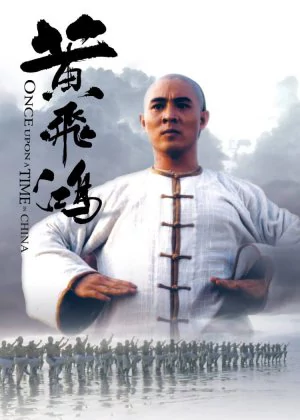Once upon a Time in China
In my quest to revisit all my 90s martial arts favorites, I've been mostly watching films from '93 so far. It's no doubt one of the most successful years in Hong Kong cinema, but of course '93 didn't just come out of nowhere. There were several landmark releases along the way that gave a glimpse of what was to come and pushed the genre in the right direction. Tsui Hark's Once upon a Time in China [Wong Fei Hung] is one of those films. It's a martial arts classic worthy of its name, a film that still knows to amaze and still stands proud amongst its peers.
![screen capture of Once upon a Time in China [Wong Fei Hung]](/thumbs/style/site/1200xauto/once-upon-china-1-1.webp)
Sergio Leone started one of the strangest traditions in film land (with West and America), countless others followed in his footsteps. Nowadays, there are a couple dozen "Once upon a Time" titles (Shanghai, Mexico, Anatolia, India, ...) though there is nothing specific that binds these films together. While the title comes with certain expectations of grandeur, the films themselves are impossible to compare. Hark's Once upon a time in China is the first in a line of 6 films (spanning 6 years), of which Hark directed 4 entries and Sammo Hung directed the final one.
Proof that the Once upon a Time branding is mostly just Western marketing can be found in the original title. Wong Fei Hung is simply the name of one of the most popular real-life martial arts legends, though many of the films (Iron Monkey, Rise of the Legend, Drunken Master, ...) and series that feature Wong aren't very realistic in their portrayal. It transformed Wong into a larger than life figure, someone whose factual history got swallowed by all the myths and fictional stories surrounding his person. On an international level though, Wong Fei Hung doesn't have that much clout and to convey the epic scope of this project, it was rebranded as a Once upon a Time film.
The story follows Wong Fei Hung, trying to find his place in a China overrun by Westerners and Western influences. Several nations have taken up a spot in the city and are trying to increase their power, pushing away local citizens. The Chinese government is in cahoots with the foreigners, drawn by the smell of money and power. Even though Wong tries to stand up to the foreigners through lawful means, it becomes clear that Chinese law is failing to protect its citizens. When Wong's friends end up fearing for their lives, Wong decides it is time to act.
![screen capture of Once upon a Time in China [Wong Fei Hung]](/thumbs/style/site/1200xauto/once-upon-china-1-2.webp)
Visually it's very much what you'd expect from a film like this. Lots of crazy camera angles, very agile camera work and sharp editing that connects and creates all the insane martial arts choreography. This being one of the first films of its kind though, it was pretty trendsetting. What's gained in adrenaline and agility is somewhat lost in attention to detail. The execution feels a little hasty at times, especially outside the action sequences, but since we're talking martial arts cinema here that isn't much of an issue. Once upon a Time in China still looks impressive when people start fighting each other, which is about half the film.
The music is very traditional, which means it's quite noisy, and it doesn't really stand out, especially the melodies. It's just there, mostly in the background yet very noticeable because of its intensity. It's functional and doesn't irritate (if you can stand Chinese music of course - some people have a rather negative reaction to it), but it's hardly an asset and does little to sell the film. Furthermore, it's on par for these types of films, it doesn't get in the way, but I still think it would be nice if directors would put their scores to better use.
Acting wise, the film benefits greatly from Jet Li's presence. Li is a terrific Wong Fei Hung and since the film leans heavily on the action sequences, a trained and renowned martial artist like Li is a real necessity. Shi-Kwan Yen is more than adequate as Li's main opponent, other familiar names like Jackie Cheung, Rosamund Kwan, Kent Cheng and Yuen Biao fill in the remainder of the key roles. It's not first class acting, but if you can deal with the accentuated comedy and stereotypes it does add an extra lightness to the film.
![screen capture of Once upon a Time in China [Wong Fei Hung]](/thumbs/style/site/1200xauto/once-upon-china-1-3.webp)
Even though Once upon a Time in China is a martial arts spectacle first and foremost, Hark does spend a lot of time on the dynamic between China and its foreign "visitors". It's not an uncommon theme or element in martial arts films, but it's definitely more pronounced compared to similar films. While Hark doesn't dig really deep or make overly grand statements with this film, it does somewhat explain how this film could rise above the crop and how it was able to spawn five more sequels.
If you love yourself some 90s martial arts and for some reason you haven't caught up with this film yet, you really owe it to yourself to get on it as quickly as possible. Jet Li is superb, the fight choreography is exquisite, the pacing is perfect and everything just feels extremely dynamic. Once upon a Time in China, like most of its contemporaries, suffers a little from Hong Kong's almost machine-like production cycle (where quantity trumps quality), but for a film this fun and entertaining that's hardly an issue. A deserved classic that will forever be a shining star in Tsui Hark's oeuvre.
